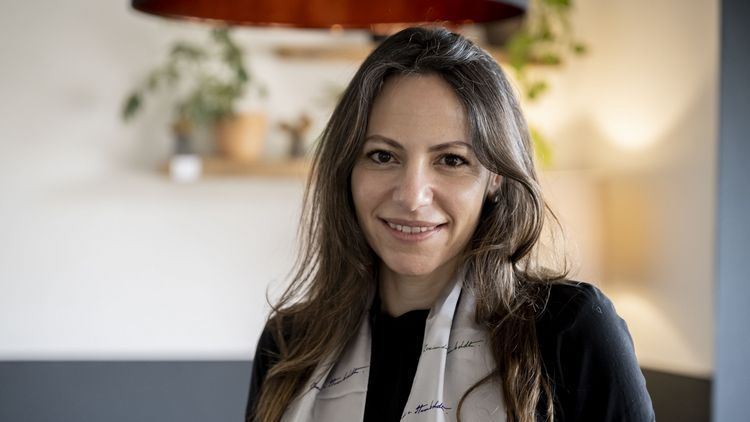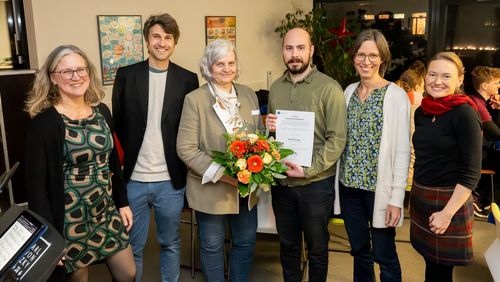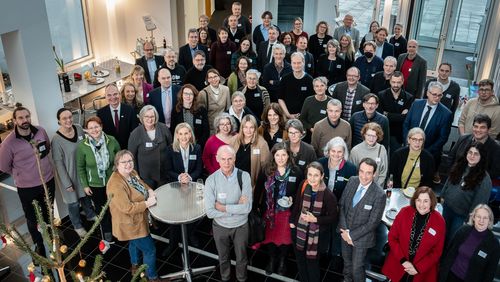Hanin Karawani Khoury normally conducts her research at the University of Haifa in Israel, more than 4,000 kilometres away from Oldenburg. Now the hearing scientist is spending a year at the University of Oldenburg on a Humboldt Research Fellowship and working with an interdisciplinary team in the Cluster of Excellence Hearing4All. Her focus is the link between age-related hearing loss and cognitive decline —and how to delay these processes.
If you want to change not just your degree programme but also your university a week before the semester begins, you have to resort to unusual measures. Dr. Hanin Karawani Khoury knows this from experience. When she decided to transfer to the University of Haifa after a successful year as a pharmacy student at the Hebrew University of Jerusalem, the deadline for enrolment had long since passed. She decided to contact the board of the Department of Communication Sciences and Disorders directly, and she must have been convincing, because within a week Karawani Khoury had transferred to the university in northern Israel, where today, 20 years later, she is a successful researcher and head of the AudioNeuro Lab based at the university’s Faculty of Social Welfare and Health Sciences. “If you want a door to open, you have to push it,” says the 39-year-old. “That’s what I always try to teach my students.”
Since then, Karawani Khoury has opened numerous doors for herself. In 2008 she received her bachelor’s degree with honours in her chosen degree programme, Communication Sciences and Disorders. This meant that she was able to go straight on to doing a doctorate on auditory learning. At the same time, she worked as a clinical audiologist and speech pathologist at Rambam Hospital in Haifa. Once she had completed her doctorate she headed to the US, where she spent two years as a postdoctoral scientist at the University of Maryland, before returning to Haifa in 2018. Working with a team of five doctoral and eight master’s students, her research centres on how auditory processing changes across a person’s life span. This research focus has now brought her as an Alexander von Humboldt Foundation fellow to the University of Oldenburg and the Cluster of Excellence Hearing4All – “one of the best locations in the world for hearing research”, as she is quick to point out.
Slowing down hearing loss
One of the hearing scientist’s goals in Oldenburg is to establish contacts and create the conditions for a long-term collaboration. “I, too, am particularly interested in the question of how we can slow down the process of hearing loss in older people,” she says, explaining the similarities between her own research and that of the Hearing4all Cluster of Excellence. As a student, she saw for herself how difficult things can be for people with hearing problems. “A neighbour with whom I was very close was hard of hearing, and this left her socially isolated,” Karawani Khoury explains. This experience was one of the reasons she decided to change her degree programme.
Karawani Khoury is pursuing two approaches in her research. First, she is investigating the effects of wearing hearing aids on the brain. Age-related hearing loss is often accompanied by a decline in cognitive functions such as learning, orientation or memory, but the correlations have yet to be researched in detail. “Together with the team from Maryland I was able to show that fitting a person with a hearing aid also improves their cognitive function,” she explains. Cognitive decline in people with hearing problems could therefore be at least partially reversible if their hearing improves thanks to hearing aids and proper use of these aids.
Multilingualism can influence comprehension
Secondly, as a person who speaks several languages herself, Karawani Khoury is investigating how growing up bilingual affects hearing and comprehension. Previous studies have shown that bilingualism influences the structure and functionality of the brain – greater activity can be measured in certain regions of the brain, including those responsible for cognition. In her lab, Karawani Khoury conducted experiments with test subjects who speak Arabic and Hebrew. The results were surprising: they had more difficulty than the monolingual comparison group understanding words that were embedded in distracting background noise – in both their first and second languages. “At a physiological level they have an advantage because their brains are more adaptable. Why they nonetheless find it harder to understand a conversation in a noisy environment is one of the open questions,” says the scientist.
Similarity of languages decisive
To come closer to the answer, she plans to investigate whether this phenomenon can also be observed in people who speak both German and Arabic while here in Oldenburg. “Whereas Hebrew is similar to Arabic, German is very different. We want to find out whether the difficulties are caused by the similarity of the languages or whether they are of a fundamental nature,” explains the hearing scientist, who is working closely with linguist Prof. Dr Esther Ruigendijk during her stay in Oldenburg.
Hanin Karawani Khoury came to Germany with her husband, who has taken a sabbatical year, and their three children. The family lives in Bremen, Haifa’s twin city, so that the children can attend an international school there. They plan to return to Haifa after the summer. “After all, our jobs and our home are waiting for us,” she says.






